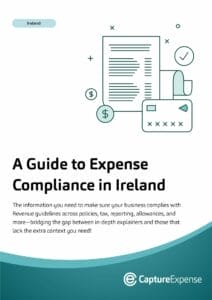We know why you’re here. You want the civil service mileage rates in Ireland for 2025. So, without further ado.
The civil service mileage rates for 2025
Here are the new civil service rates for mileage allowance in Ireland for 2025, set by Revenue, effective from 1st September 2023.
The rates vary depending on the type of vehicle, which includes cars, motorcycles, or bicycles. They also depend on the distance bands and the mileage allowance rate in euros per kilometre.
Civil service motoring and bicycle rates
Cars (rate per kilometre)
Motor travel rates (from 1 September 2022)
| Distance band | Engine capacity up to 1200cc | Engine capacity 1201cc – 1500cc | Engine capacity 1501cc and over |
| Up to 1,500 km (Band 1) | 41.80 cent | 43.40 cent | 51.82 cent |
| 1,501 – 5,500 km (Band 2) | 72.64 cent | 79.18 cent | 90.63 cent |
| 5,501 – 25,000 km (Band 3) | 31.78 cent | 31.79 cent | 39.22 cent |
| 25,001 km and over (Band 4) | 20.56 cent | 23.85 cent | 25.87 cent |
For electric vehicles, mileage claims will follow the rate applicable to engine capacity 1201cc-1500cc.
Reduced motor travel rates per kilometre
| Engine Capacity up to 1200cc | Engine Capacity 1201cc to 1500cc | Engine Capacity 1501cc and over |
| 21.23 cent | 23.80 cent | 25.96 cent |
Reduced mileage rates apply to work-related journeys that aren’t solely for job performance. Examples include attendance at approved courses or conferences.
Motorcycles (rate per kilometre)
Motorcycle rates (from 5 March 2009)
| Distance | Engine capacity up to 150cc | Engine capacity 151cc – 250 cc | Engine capacity 251 cc – 600 cc | Engine capacity 601cc and over |
| Up to 6,437 km | 14.48 cent | 20.10 cent | 23.72 cent | 28.59 cent |
| 6,438 km and over | 9.37 cent | 13.31 cent | 15.29 cent | 17.60 cent |
Bicycles
Bicycle rates (from 1 February 2007)
| Rate per km | 8 cent |
Staying compliant
Now, onto the nitty gritty.
In this guide, we’ll tackle the intricacies of car mileage allowance in Ireland for 2025. From what constitutes a business journey and how to calculate it, to submitting a compliant mileage claim.
Join us as we equip you with everything you need to know about civil service mileage rates in the Emerald Isle.
What is a business journey and how do you calculate it?
A business journey refers to travel undertaken by an employee for work-related purposes. Specifically, when they travel from one place of work to another place of work as part of their duties.
This encompasses:
- Travel between different countries, such as between Ireland and other countries.
- Travel to a location that is not their usual place of work.
It’s worth noting that a business journey does not include commuting from home to the normal place of work and vice versa; this is considered private travel.
Calculating the distance for business travel
When calculating the distance for business travel, the relevant distance is the lesser of:
- The distance between the employee’s home and the temporary place of work.
- The distance between the employee’s normal place of work and the temporary place of work.
Let’s take a look at an example:
Imagine that the distance from your employee’s home to a temporary workplace is 50 km. And that the distance from their normal workplace to the temporary one is 30 km.
The business travel distance will be: 30km (the lower of the two distances).
What’s not included in the mileage allowance?
Not all trips are eligible for reimbursement under the civil service mileage rates in Ireland.
The most common trips which aren’t included are
- Personal trips that aren’t directly related to your employee’s job.
- Trips between your employee’s home and their regular workplace.
How to submit a mileage allowance claim in Ireland
To be reimbursed for business-related vehicle expenses, your employees must complete a claim form provided by the company or Revenue. They must also submit evidence of the journeys made in their personal vehicle.
Your employees should keep the following evidence:
- Receipts for petrol
- Receipts for parking tolls
- Any additional receipts pertaining to vehicle usage
- Addresses visited during travel
- Purpose of each journey
- Recorded kilometres driven to and from business travel destinations
You must maintain accurate records of all your employees’ claims and provide full evidence to ensure compliance and avoid issues with Revenue.
It’s worth noting that if you have already reimbursed an employee’s expenses at civil service mileage rates, no additional tax relief will be applicable to the employee.
How to keep track of your mileage expenses
It’s essential for both you and your employees to maintain precise records of all work-related trips.
Failure to do so could result in Revenue requesting that these payments be treated as taxable income.
The required records include:
- Name
- Address(es) visited during travel
- Date(s) of the work trip
- Purpose of the journey
- Distance travelled
- The trip’s originating point, planned destination, and final destination
- Documentation for reimbursement (e.g., receipts or mileage rate)

Get the latest insights and product updates, direct to your inbox.
FAQs
What is classed as normal place of work?
The normal place of work is where employees usually carry out their job duties. It’s typically where the employer provides the necessary resources for them to work. This might vary depending on the employee’s role. Generally, the normal place of work is not considered the same as where the employee lives. This is unless there’s an objective requirement for them to work from home because their tasks cannot be done elsewhere. If an employee chooses to work from home or if the tasks performed there are minor or administrative, it’s not considered their normal place of work.
Are sole traders eligible to claim mileage?
Sole traders are not eligible to claim mileage using the civil service mileage rates. Instead, they can only claim for the actual expenses they incur, such as fuel, motor tax, motor insurance, hotels, and related expenses. To do this, sole traders should keep detailed receipts for the business portion of these costs. This ensures that their claims are accurate and compliant with tax regulations.
Do the civil service mileage rates apply to emergency travel?
Yes, the civil service mileage rates do apply to emergency travel.
When an employee needs to work outside their normal hours to address emergencies requiring immediate attention, you can repay their travel expenses. This includes mileage, which can be reimbursed using the civil service mileage rates.
This reimbursement is tax-free and can be claimed for up to 60 emergencies per year. However, it does not apply to non-emergencies such as covering for absent staff, handling increased workloads, or attending routine events.
Do the civil service mileage rates apply to voluntary work?
Yes, organisations with altruistic and non-commercial functions, such as registered charities or sports bodies, can repay travel expenses to individuals working voluntarily and unpaid.
These expenses are tax-free as long as they are necessary for the individual to perform their work and do not exceed the actual costs incurred. However, the payments must not exceed the civil service rates.
Never miscalculate mileage claims with Capture Expense
Capture Expense ensures compliance with Ireland’s civil service mileage rates by managing cumulative mileage bands and automatically calculating the correct reimbursement rates based on fuel type, engine size, and distance travelled.
Our platform seamlessly integrates with Google Maps to accurately calculate your employees’ travel distances. It automatically selects the shorter route from either your employee’s home or their normal place of work. This ensures full compliance with Revenue’s guidelines.
Allow your people to raise, submit and approve their vehicle expenses at any time, from any location through the Capture Expense app and streamline the way your organisation manages spend. Book your personalised demo now.

Expense Compliance in Ireland
The information you need to make sure your business complies with Revenue guidelines across policies, tax, reporting, allowances, and more—bridging the gap between in-depth explainers and those that lack the extra context you need!

